What makes a winning farmers market
At the farmers market of the year, Barnard Castle, County Durham
If you’re British, you know Barnard Castle. Even if you’ve not been there, it's bound to be at the back of your mind. Dominic Cummings drove to Barney during the COVID lock-down, giving a certain ocular manufacturer their best tag line ever.
Barnard Castle is a pretty market town in County Durham in the NE of England, bordered by the ruins of its namesake Medieval Castle and the Bowes Collection, more of which later.
Its monthly farmers market was recently awarded farmers market of the year by the Farm Retail Association. According to Emma Mosey, chair of the FRA, the process is rigorous
‘with up to four judges from the industry judging the entry forms, a shortlist is drawn up and each one is visited by a judge and then by a mystery shopper.’
Barnard Castle Farmer’s Market won for its great customer experience, stallholder enthusiasm, interaction and atmosphere.
The town feels as if it's balancing between the ordinary, the extraordinary and everything in-between. On Friday night the chip shop queue is out the door. There’s a Greggs next to artisan bakery Rise. No shortage of tea shops, coffee shops and gift shops. 2 thriving butchers and a deli. There's the usual complement of charity shops, and a few empty properties, but compared to the nearby city of Durham, it's thriving. The road down to the river is lined with antique shops. When I arrive in the late afternoon, I notice that the tables outside the pub I pass are packed with people. ‘The Costa del Barney ‘ says my b&b host. ‘Not my kind of place ‘.

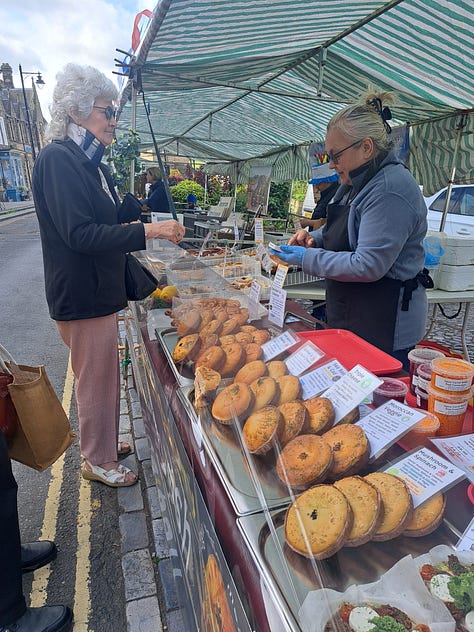
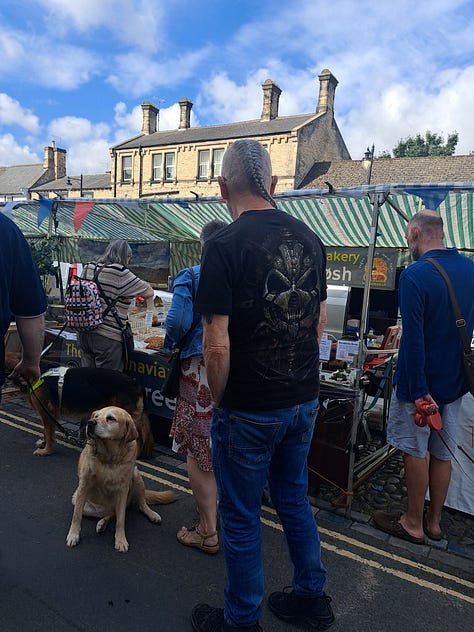
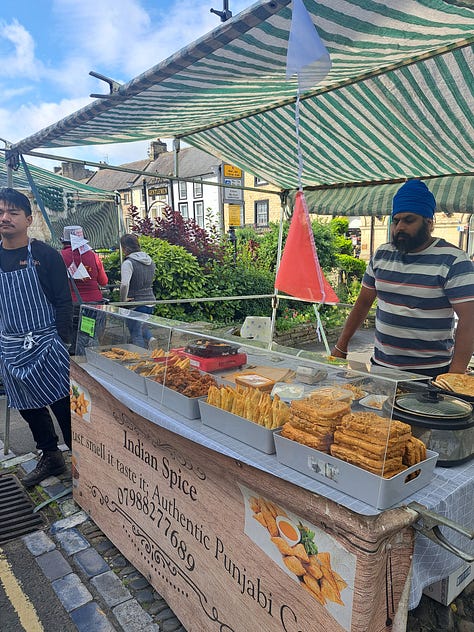

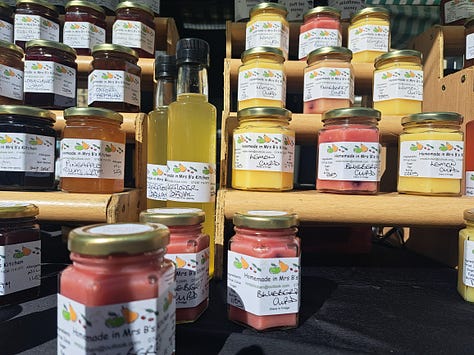



The next day at the market, a few stalls are still setting up just after the opening time of 9am. There’s a quiet frisson of excitement. A couple of people are strolling up and down checking out what’s on offer. Stall holders are hailing regulars with cheery waves.
Lovesome rape seed oil, Wiga Wagaa hot sauces and Lowfield Gardens cut flowers and plants come from inside Country Durham. Others such as Pie Demand come from Cumbria. Muckle Brewing travels down from Northumberland. Historically, the stall holder radius is 50 miles of the market, but exceptions are made if they can't find a product within their radius.
There are several meat and poultry stalls, two cheese stalls, a Scandinavian bakery. Andrew the market manager makes and sells Scotch eggs on Cassie’s Kitchen’s stall. Ann, another market manager makes and sells preserves with her husband as Mrs B’s Kitchen. There’s fudge, cakes, a hot food van, Punjabi Cuisine, charcuterie, cheesecakes and crafts. Some stalls are away for August (wine, a mushroom grower, bread makers.)
Jonathan is arranging cheese on his Teesdale Cheesemakers stall. He runs the business with his wife; he collects the milk from his brothers farm down the road, she makes the cheese, he comes to market. Their on farm business included cheese making courses and glamping. He tells me they have just taken delivery of a 1970s caravan for visitors to stay in.
He’s been selling here since 2015, sticking with it because ‘it’s a steady income stream once a month and a good marketing platform’. He only attends ‘a select handful of other markets now; Barney is one of the best.’
Jonathan stops arranging cheese to greet a regular customer; ‘are you just cruising up and down; is this your first sweep of the market this morning?’.
Cutting me a piece of cheese to try; ‘We have a good strong customer base of regulars; I don’t rely on tourists or transient customers. It’s a good mix; it’s almost a habit’. He's a good salesman too. I leave with two of their cheeses.
Customer Judith Parks travels by bus to the market from Darlington each month. She’s happy with the market; ‘there’s a lot of stalls, everyone’s very friendly and I know it’s good.’
It’s called the Dolly Parton look because it puts everything on show up front
Over on Heartwood Poultry, farmer David Knipe is leaning over his chiller, pointing out to a customer that the eggs are small this week as they’re from young chickens. He informs me that Heartwood is the only free range chicken and duck farm left in Cumbria. They’re a small farm, processing around 80 birds a week.
His chickens are trussed with ‘proper string. The old fashioned way to keep the bird nice and tight so you don’t get a slack Alice look. It’s also called the Dolly Parton look because it puts everything on show up front.’
If you want to know how David trusses a chicken listen HERE
‘Butchers’ he says with disgust, ‘put an elastic band on, and ones for supermarkets leave a bit of leg on and tuck it under the skin. Very clever because an inch of leg on either side weights more’. He continues; ‘it takes me about 45 seconds to do one. It’s the presentation that makes it look far better’.
A customer is given a handful of silver in change. ‘I’m sorry, I’m giving you politician coins, you know why?’ There’s a pause for effect. ‘Because they’re small, useless and not worth a lot’.
‘Sadly’ David remarks, ‘shoppers at supermarkets generally get a grunt. I’m the producer. I’m passionate about what I do. These are the same breed as in supermarkets, just raised totally differently.’
He’s on a roll here as he tells me how his chickens compare to the average supermarket bird. ‘It’s what people want, cheap white meat and that’s what they’re getting. Their chickens will have had warmth, bedding, feed, and a hell of a lot of close friends.’ His chickens by comparison go outside once they’re fully feathered, and stay on the farm for between 98-112 days. Given that organic chickens live for an average of 81 days, that’s a big difference. As David says, ‘slower growing and not 60% water. The others, they spend their time eating and drinking, that’s all they do. You’ve got to look at the bigger picture to make it value for money.’
Pointing to his chickens on display he adds;
‘That’ll feed a family of 4 for four meals.’
He’s happy that his customers want something that’s had a life ‘and that makes a difference, and you have that dialogue’. It’s no surprise that the most important aspect of the market for David is talking to the public. Not educating them, he corrects himself. Informing people. Being open.

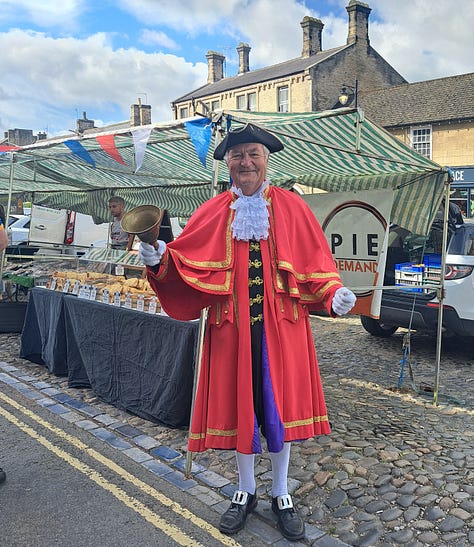

The market is warming up and getting crowded as the town crier announces a choir to sing for the markets’ 25th anniversary. Dogs to meet, neighbours to chat to.
Deer and Dexter farm red deer and Dexter cows near Penrith in Cumbria. Jane Emerson has been selling at Barnard Castle farmers market since 2003, shortly after losing all her stock through foot and mouth disease.
‘We had to reinvent ourselves’ she says. ‘We got the cows and here we are today. It’s a long time ago; it did change a lot of people, the way they operated, to make new decisions.’
When I ask what being at the market has taught her, there’s no hesitation. ‘It’s taught me to sell because I’d never sold direct before. We were selling livestock before so it gave us the opportunity to learn and sell on a small scale because we didn’t have a lot of animals. We meet people at the market, learnt what they wanted. When we first started we had to persuade people to eat venison but now they eat it, and tv chefs were helpful promoting Dexter as a breed; that helped a lot.’ She pauses to think. ‘Markets are good. You learn from other producers, watch how they do it.’
Over at Alison’s Country Pantry, her stall is laid out with home made cakes and biscuits, very like an old fashioned WI country market stall. As one of the original stall holders, Alison has sold here for 25 years. ‘Nothing’s changed’ she says, ‘other than different traders’.
‘It’s the camaraderie of stall holders and customers; we’ve built up regular customers, have a bit of banter. Find out what’s going on in their lives, they find out what’s happening in ours. The whole rapport between customers and traders makes it special. The atmosphere of the place.’
Market manager Andrew took over the running of the market in December 2023 and is in his 4th year of trading at the market. He is equally delighted about the markets’ 25th anniversary and their farmers market of the year award. ‘It’s a well oiled machine’ he smiles. ‘Most of the traders have been here a long time.’
The markets ethos he tells me, is rooted in local produce and local people, sustainability and food miles. He’s proud of the traders; as he says; ‘We’re a real community. We’re a trader run market. We’re not run by an independent company. We’re all volunteers who run the market and committee. My pay as market manager is I don’t pay a pitch fee but even if I had to pay, I’d still do it. If nobody does it (manages the market), the market stops, and that’s no good for anyone.
We have a sense of ownership for the market and we all invest in it, we all play our part’
Would the market work weekly? Andrew is doubtful. ‘Because it’s monthly, people get excited for it and they’ll come.’
There is an elephant in the room; the total lack of any fruit and vegetable farms at the market. Because the market is accredited by the Farm Retail Association, Andrew won’t let in a vegetable wholesaler, it has to be a grower. He tells me;
‘We haven’t had anyone for a year since Bluebell organics retired. We’re not alone in this. It’s a dying trade; there’s not much profit or value in it for people to be producers and sellers. Supermarkets are the big issue. It’s a generational thing; there’s nobody local we can get to come and sell fruit and vegetables. It’s just one of those unfortuate things’
One meat stall on the market is selling a small selection of charcuterie, and bought in raw meat and poultry. Andrew points out that he buys in meat to make his Scotch eggs, and that the stall in question is allowed in because they make charcuterie, a value added product. Other markets in the UK may not allow them to sell but here they’re a welcome addition.
As a non profit organisation any profit is reinvested in the market. The local council don’t charge them for the space but they pay to have stalls put up and taken down.
Luckily there’s no fallout between traders, as Andrew says; ‘We're a friendly bunch. I think a lot of it is down to the way the market is curated to avoid too much crossover.’
It’s time for the cake to be cut by Ann and Andrew, and shared out amongst stall holders. It's difficult to pinpoint exactly what makes the market an award winner. There's a sense of happiness amongst stall holders, and an intangible distinctiveness.
Happy 25th anniversary.

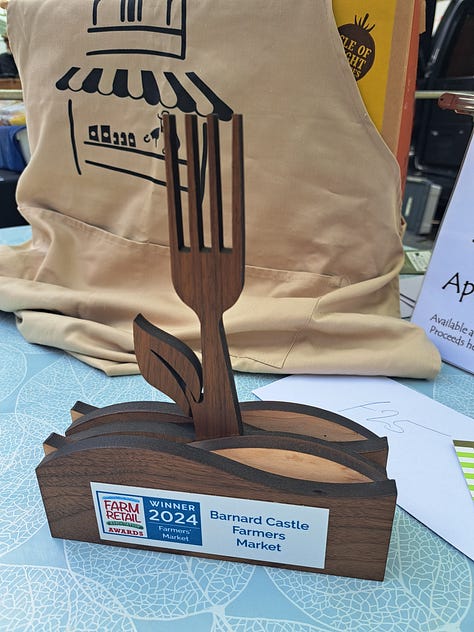
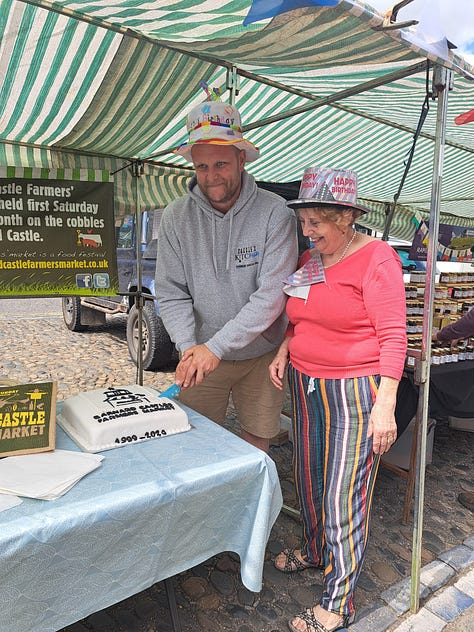
The market takes place on the first Saturday of every month, on the Cobbles in the centre of the high street.
Is the market worth going to? Yes if you’re in the area.
What else to see in Barney; it’s a quirky little town with plenty of references to Charles Dickens. The Buttermarket, castle ruins, riverside walks, and a plethora of independent shops.
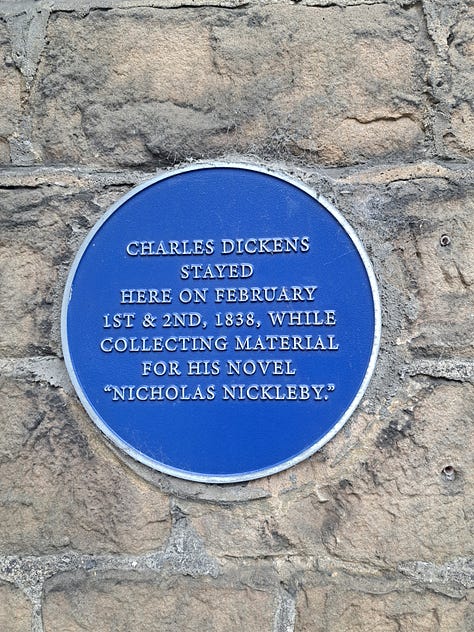


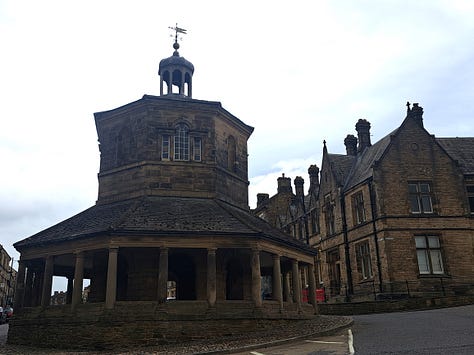


Recommendations; McNabs bookshop and No.15 Coffee House. A welcoming independent book shop working in tandem with the cafe next door (order in the cafe, take your coffee and cake into the bookshop, sink into a sofa, buy a book.)
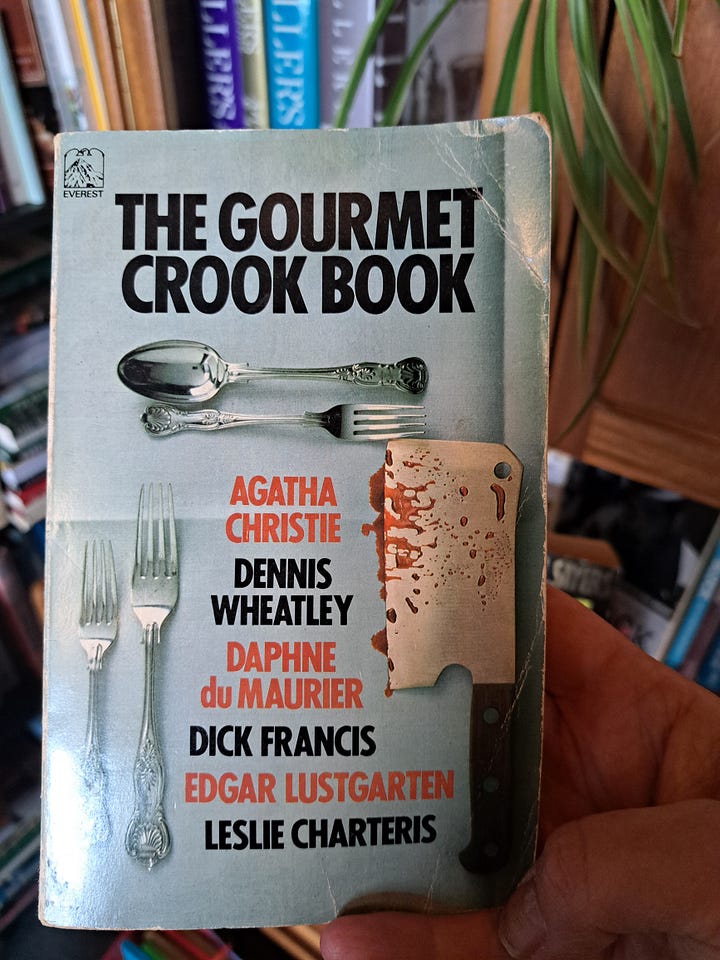
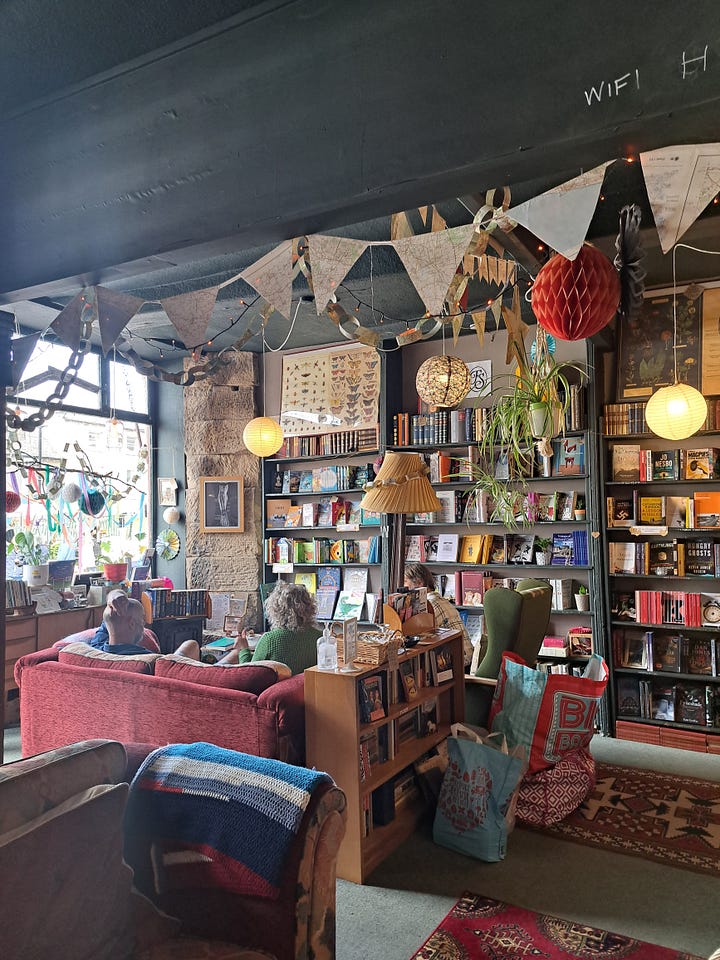
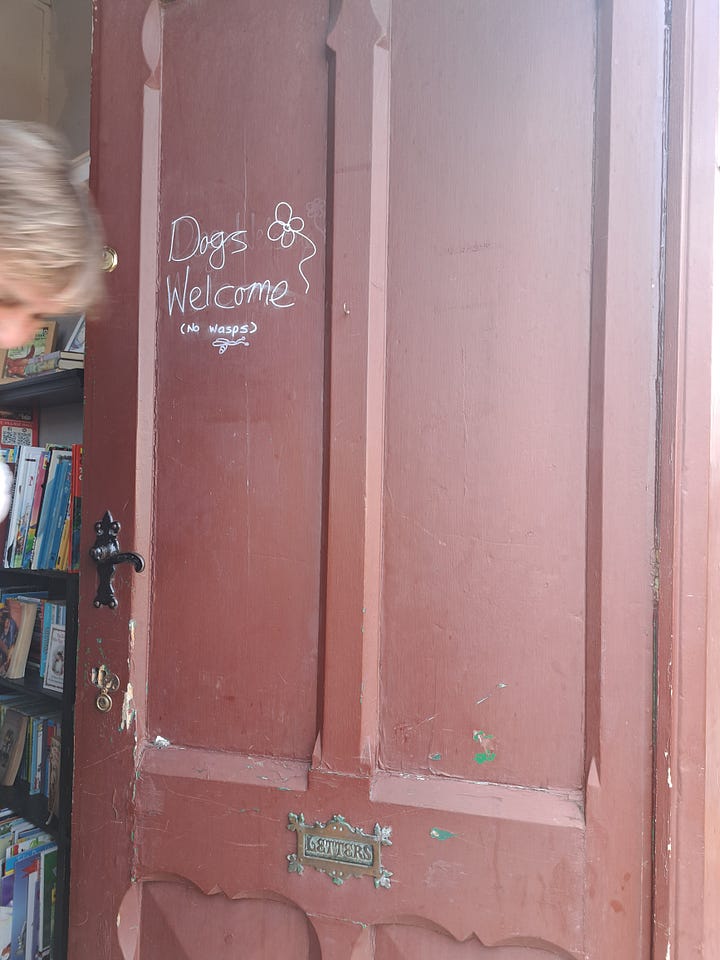

Rise Bakery; do try the Teesdale curd tart



Edje’s Coffee; a little place at the top of the high street with very good coffee.
The Bowes Museum. The opulence of the collection contrasts with the current exhibition: Kith & Kin. L.S Lowrey & pitman painter Norman Cornish, representing Northern working class life amongst the frills and gilded fripperies of Bowes. Beauty in the ordinary. On until January 2025.
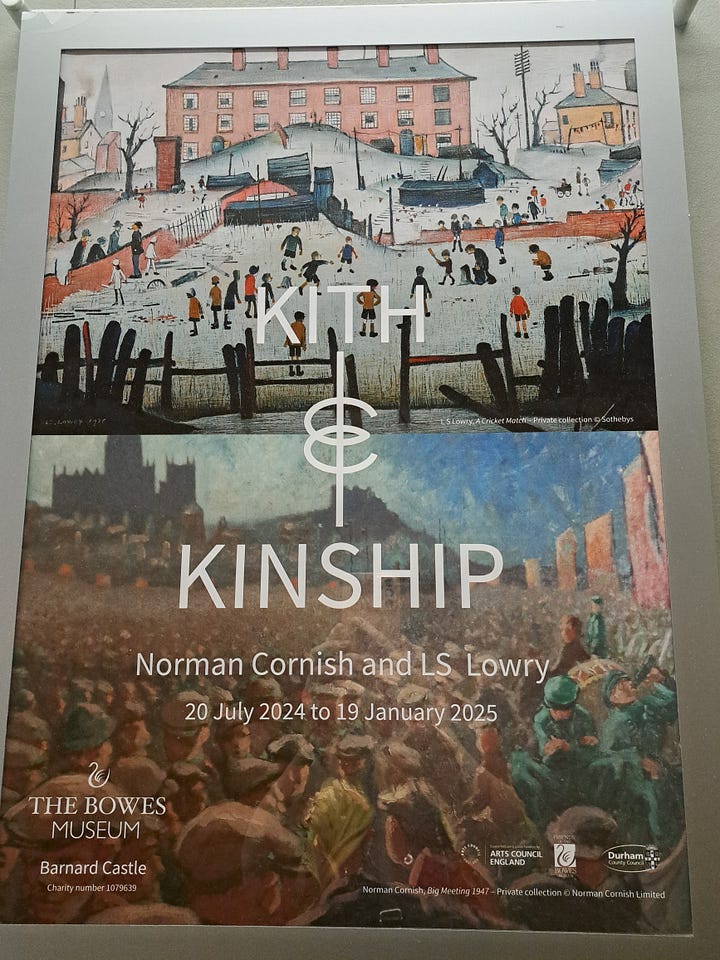







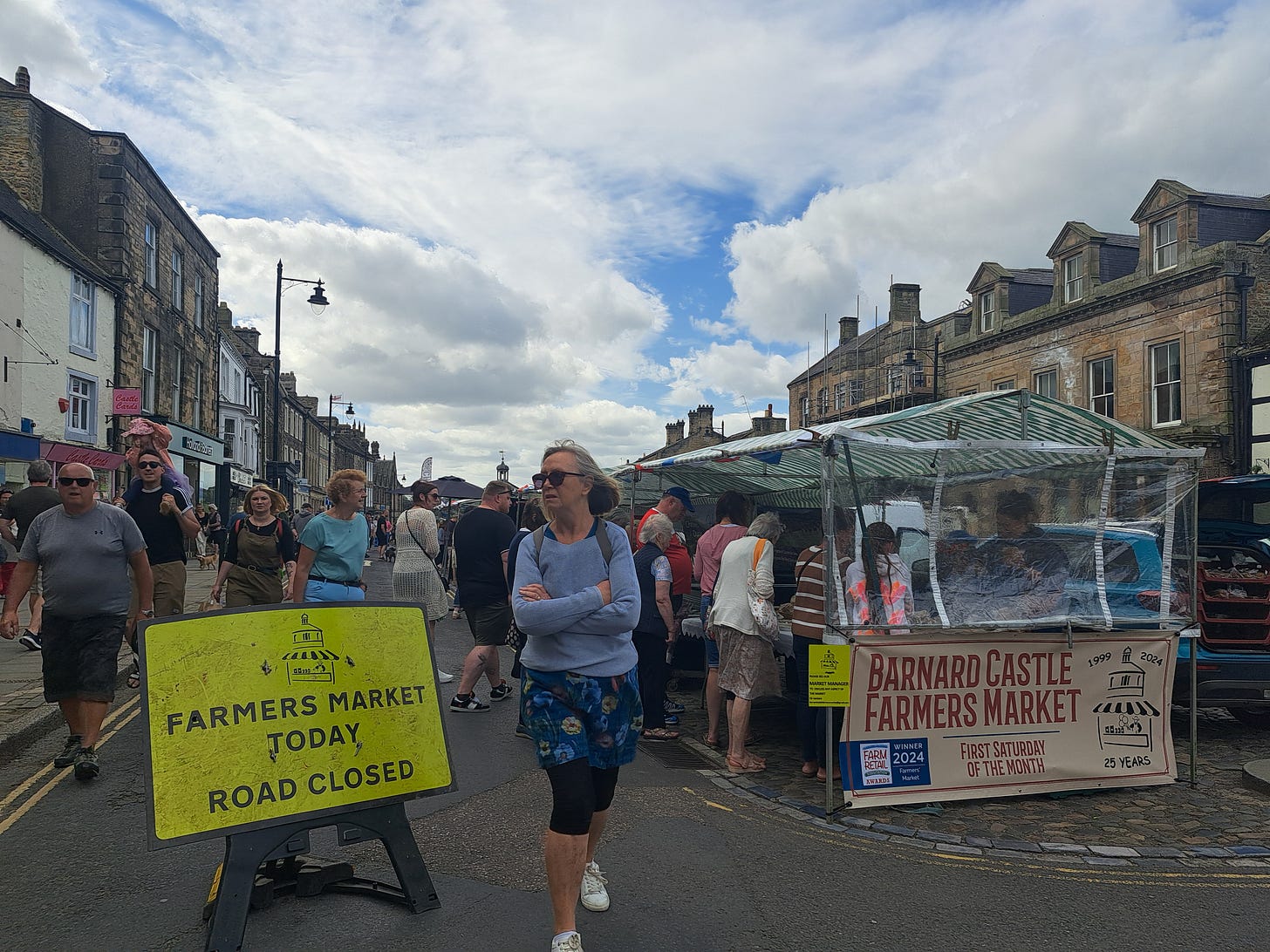


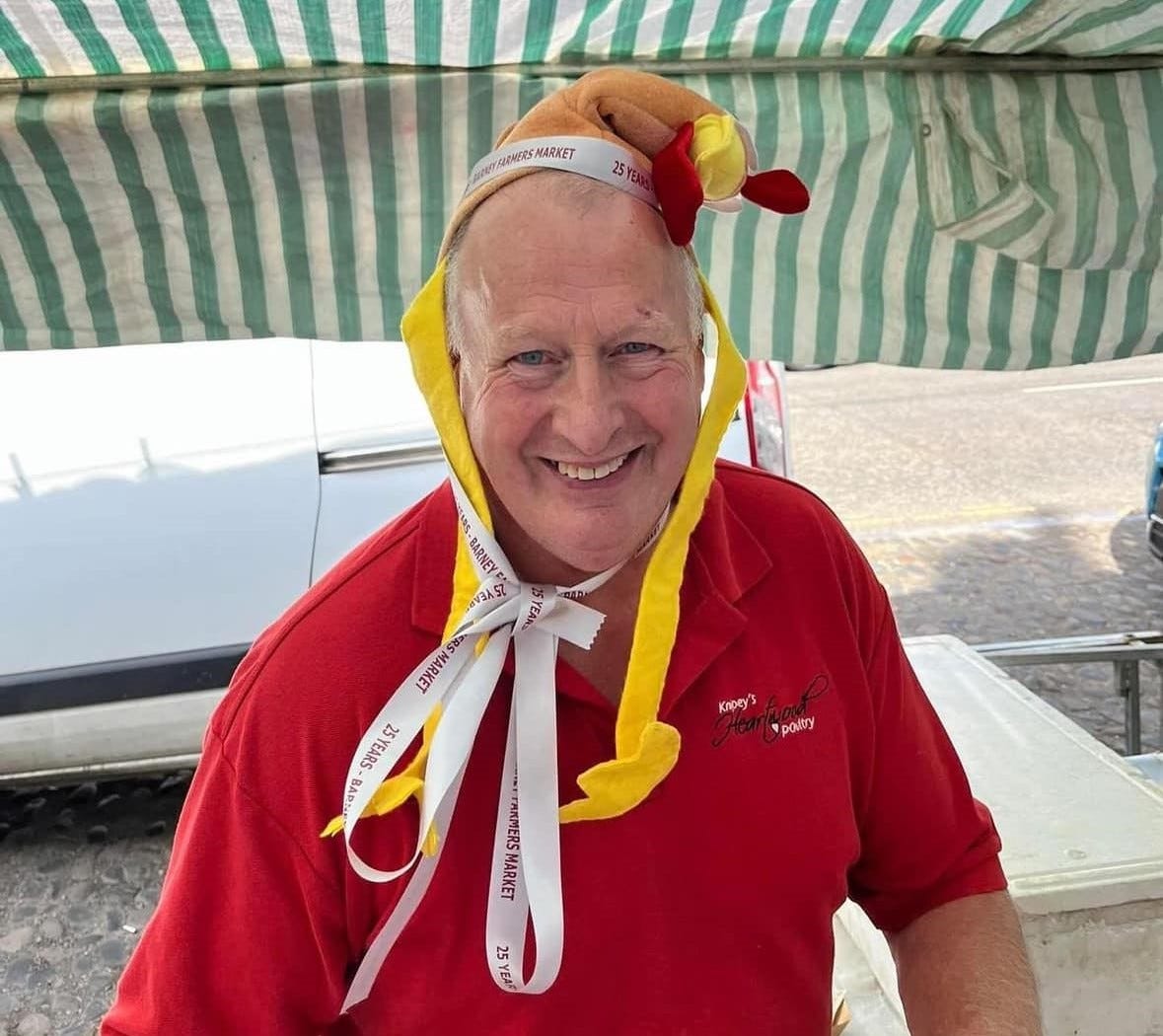

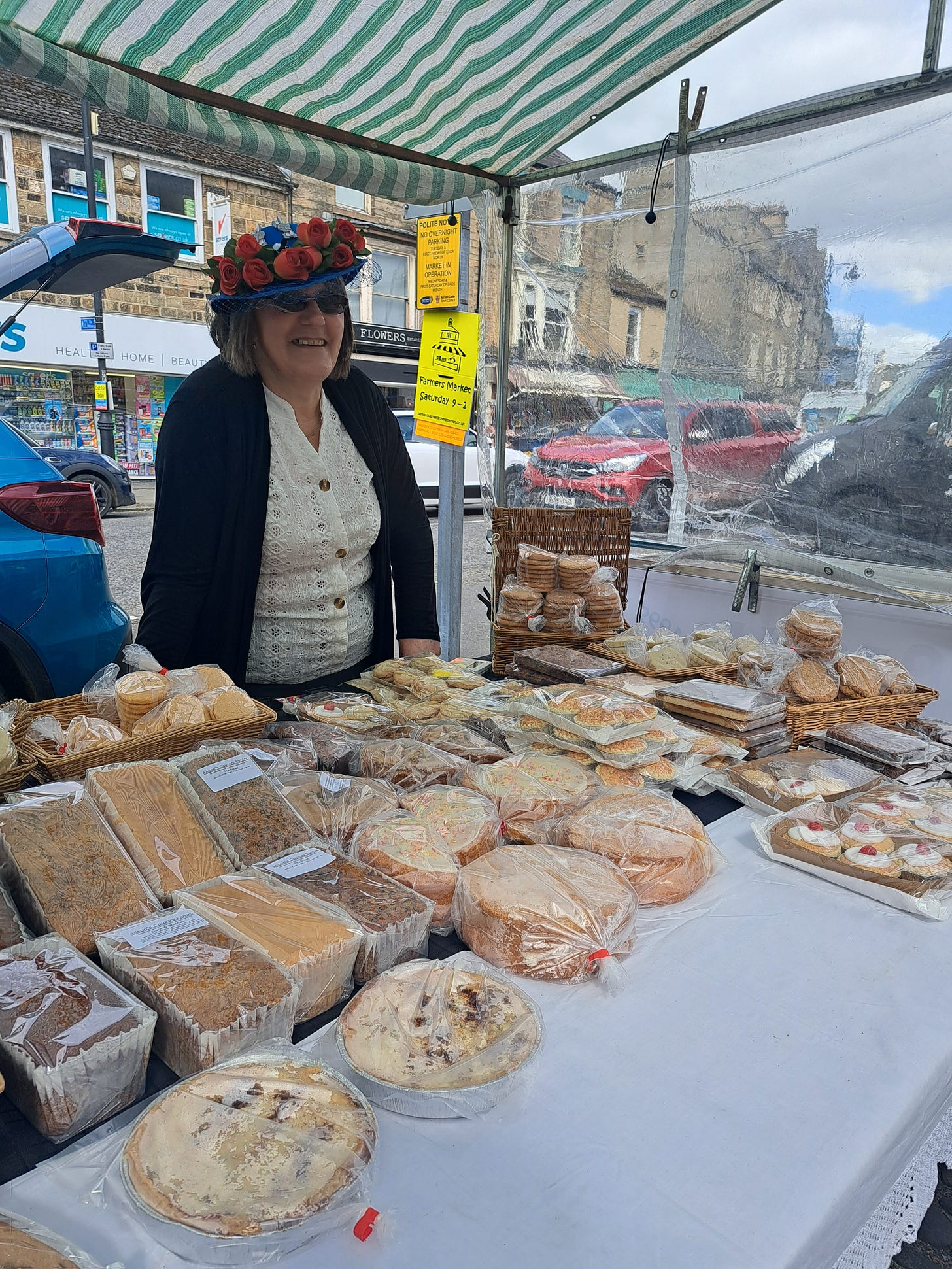
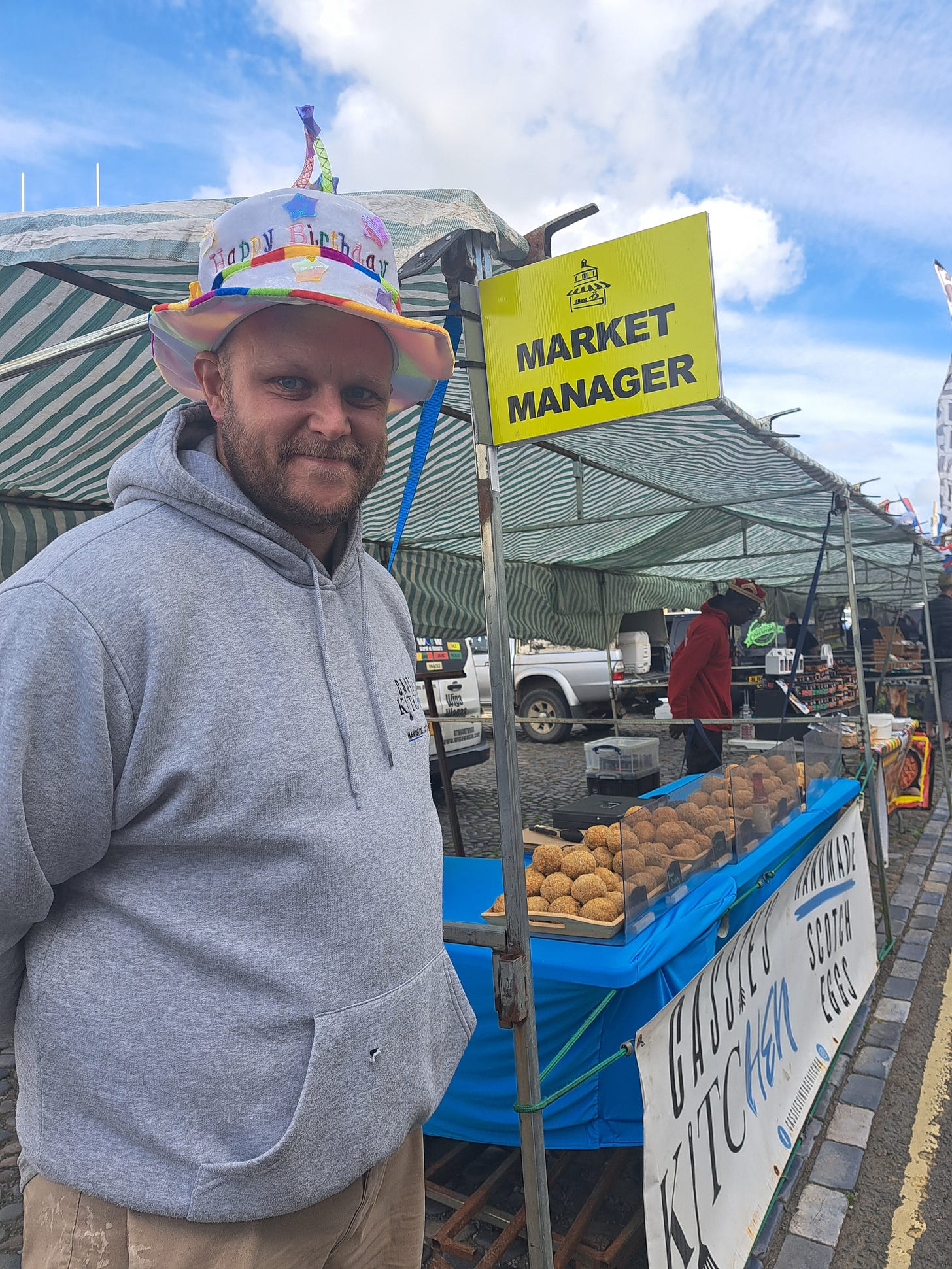

I don't know Barnard castle, ;p, great post, keep it up x
Enjoyed the article. Barney really is a very friendly market